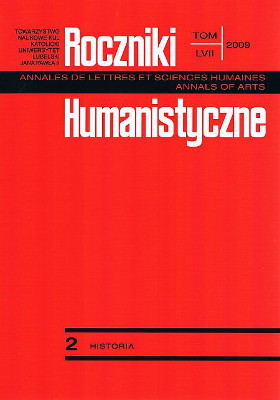Zasady funkcjonowania Komisji Edukacji Narodowej jako pierwszego Ministerstwa Oświaty
Abstrakt
The present study discusses the issue of the supreme school authorities of the last decades of the 18th century in the First Polish Republic. The rules according to which the Commission of National Education (KEN) functioned as well as its political position are characterized. The main subject of the work is showing in what way the KEN was independent of the authorities of the state, owing to which we may talk about the institution as the first Ministry of Education. The origin of the Commission is discussed against the background of education reforms in selected European countries like Prussia, Austria and France. However, these countries did not establish so independent education departments as it was the case with Poland.
Apart from this institutions are discussed that were parts of the KEN, and without which it would be impossible to effect the reforms, namely, the Society for Elementary Books and the office of General Inspectors. The former one was responsible for curricula and handbooks, but it often had to take over part of the duties of the very KEN. The inspectors were a kind of a link between the central education authorities and schools all over Poland; they also supervised effecting the reforms and passed the postulates formulated by the education system employees to the Commission. In the conclusion the effects of the KEN's work and its influence on the society harassed by the partitions are summarized. The whole allows the reader to have a closer look at the functioning of the schooling system of that time from the historical-legal perspective.
Bibliografia
Jobert A.: Komisja Edukacji Narodowej w Polsce 1773-1794, Wrocław–Warszawa–Kraków–Gdańsk 1979.
Kot S.: Historia wychowania, t. II, Warszawa 1994.
Kukulski Z.: Pierwiastkowe przepisy pedagogiczne KEN z lat 1773-1776, Lublin 1923.
Kurdybacha Ł., Mitera-Dobrowolska M.: Komisja Edukacji Narodowej, Warszawa 1973.
Lubieniecka J.: Towarzystwo do Ksiąg Elementarnych, Warszawa 1960.
Mizia T.: O Komisji Edukacji Narodowej, Warszawa 1972.
Mrozowska K.: Funkcjonowanie systemu szkolnego KEN na terenie Korony w latach 1783-1793, Wrocław–Warszawa–Kraków–Gdańsk–Łódź 1985.
Mrozowska K.: Towarzystwo do Ksiąg Elementarnych a Komisja Edukacji Narodowej, w: Rozprawy z dziejów oświaty, t. XX, red. J. Miąso, Wrocław–Warszawa–Kraków–Gdańsk 1977.
Salmonowicz S.: Podstawy prawne funkcjonowania Komisji Edukacji Narodowej, w: Rozprawy z dziejów oświaty, t. XXIII, red. J. Miąso, Wrocław–Warszawa–Kraków–Gdańsk 1980.
Skoczek J.: Wybór pism pedagogicznych Polski doby odrodzenia, Wrocław 1956.
Suchodolski B.: Komisja Edukacji Narodowej na tle roli oświaty w dziejowym rozwoju Polski, Warszawa 1973.
Szybiak I.: Praktyka stanu nauczycielskiego w świetle instrukcji dla wizytatorów szkół Komisji Edukacji Narodowej, w: Rozprawy z dziejów oświaty, t. XX, red. J. Miąso, Wrocław–Warszawa–Kraków–Gdańsk 1977.
Tync S.: Komisja Edukacji Narodowej – Pisma Komisji i o Komisji, Wrocław 1954.
Wolanowski A., Wołoszyński R.W.: Komisja Edukacji Narodowej, Warszawa 1973.
Copyright (c) 2009 Roczniki Humanistyczne

Utwór dostępny jest na licencji Creative Commons Uznanie autorstwa – Użycie niekomercyjne – Bez utworów zależnych 4.0 Międzynarodowe.





